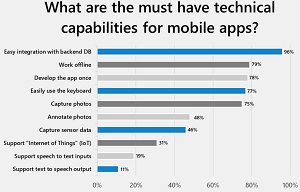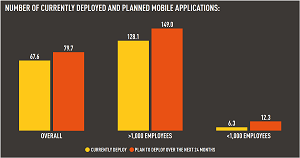News
Mobile Dev Success: All About that MBaaS
- By David Ramel
- January 21, 2016
You might say it's all about that MBaaS, no trouble.
New reports from mobile app development organizations show how Mobile Back-end-as-a-Service (MBaaS) is crucial to enterprise mobility success, especially when using rapid application development (RAD) or low-code tools.
MBaaS refers to the simplified provisioning of back-end services to support mobile apps, providing services such as cloud database storage, push notifications, social networking integration and more. "Although a fairly nascent industry," Wikipedia says, "trends indicate that these services are gaining mainstream traction with enterprise consumers."
And also with enterprise developers, according to two brand-new studies, one from Alpha Software Corp. and one from the Enterprise Mobility Exchange. Alpha Software is known for its Alpha Anywhere platform for rapidly developing mobile business apps. The Enterprise Mobility Exchange is an online community for professionals who are leveraging mobile technology and services. Both studies examined MBaaS as part of a larger context, and both focused on the RAD or low-code markets.
"There has been a marked increase in the focus on the integration of mobile applications with back-end applications creating opportunities for more flexible enterprise back-end services," stated the "Looking Ahead to 2016: The Enterprise Mobility Exchange Analyst Insight Report," based on a survey conducted by VDC Research.
MBaaS is attractive to large enterprises, the report said, because it relieves the drudgery of recoding common functions in mobile apps and lets Web developers transfer their skills to the mobile arena. It also simplifies many potentially complicated coding tasks.
 [Click on image for larger view.]
The Must-Haves (source: Alpha Software)
[Click on image for larger view.]
The Must-Haves (source: Alpha Software)
"VDC's data shows that integration with back-end systems and databases is consistently one of the most challenging elements of extending applications to mobile platforms," the report said. That's no surprise to anyone who has wrestled with connection strings and identity management when hooking into remote databases.
Perhaps because of those challenges, respondents to the Alpha Software survey reported that "easy integration with back-end database" was No. 1 among the "must have technical capabilities for mobile apps."
"96 percent of developers rate this as a 'definitely must have' capability," said the report, titled "Enterprise Developers Rank Critical Requirements for Success in the Coming Mobile App Explosion" and conducted by Bock & Company. "The success of an overall mobile enterprise app depends on leveraging the relevant data that the firm already collects." Being able to work offline was a distant No. 2, mentioned by 79 percent of respondents.
"From the mobile app developers' perspective, a low-code platform should integrate with back-end databases and support end-to-end mobile experiences," the Alpha report said. That was a continuing theme throughout the report. In fact, after security, "connect to back-end database" was also in the running for "essential business requirements for mobile app development platforms." Security, reported by 96 percent of respondents, is always at the top of such survey answers. But database connectivity is grouped in second place, along with "accelerate application development" and "operate offline," all chosen by 78 percent to 79 percent of respondents.
Alpha emphasized that enterprises should take a holistic approach to successful mobility initiatives, counting MBaaS as just one critical factor leading to success. "It is important to consider end-to-end experiences, how the front-end apps affect -- and are affected by -- the underlying application architecture and existing back-end services, as well as how workflow and business rules play a role," the report stated.
In such holistic approaches, MBaaS tooling is also important, of course, and the Enterprise Mobility Exchange study indicated new coding tools are becoming available, but in an increasingly fragmented market.
"Internal development teams are experimenting with new platforms and tools to gain efficiencies as they create new back-end services, connect to existing services and create custom front ends for services," the Enterprise Mobility Exchange report said. "Organizations are keen on being able to save time in the coding and prototyping process and, predictably, are price conscious. But organizations also place weight heavily on the maturity of the platform they choose (market penetration) as well as the size and level of engagement of the developer community."
 [Click on image for larger view.]
Apps in the Works (source: Enterprise Mobility Exchange)
[Click on image for larger view.]
Apps in the Works (source: Enterprise Mobility Exchange)
With such important choices to be made, all those new tools and platforms might be overwhelming to organizations, the report continued.
"The mBaaS platform market has quickly become fragmented due to the functionality that some companies have begun offering," it stated. "This has made vendor selection confusing and a challenge for prospective buyers of mobile development platform solutions."
And though such choices may be tough to make, they need to be made, as enterprise mobility is poised to grow significantly in the new year, to which both studies attest.
"The volume of mobile applications developed and supported by enterprises continues to grow," the Alpha report said. "According to VDC's research, large organizations have deployed an average of 128 mobile applications and are expecting their deployments to expand by 16.3 percent in the next 12-24 months."
The Enterprise Mobility Exchange report also predicted an increase in the number of mobile apps that enterprises will build this year. "The majority of those surveyed, 63 percent, plan to develop up to five mobile apps in 2016, and 23 percent expect to develop six or more apps," it said. "Developers and end-users want rapid-delivery of mobile app solutions to improve business practices, creating better experiences for their customers, partners and employees."
Bock & Company polled 1,950 developers to learn which factors they see as critical to success in mobile app development. No other methodology was provided by either survey.
About the Author
David Ramel is an editor and writer at Converge 360.